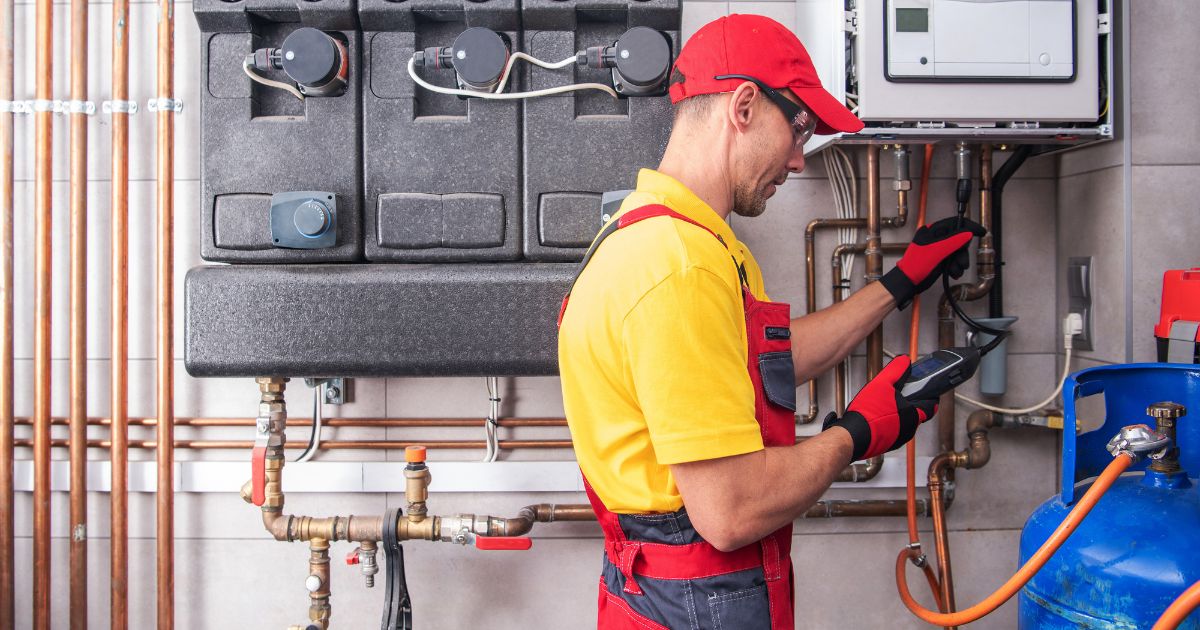How to Start an HVAC Business – Key Steps for Success
Are you considering diving into the HVAC (Heating, Ventilation, and Air Conditioning) business? Whether you’re a seasoned technician looking to be your boss or a newcomer passionate about providing comfort to others, learning how to start an HVAC business can be rewarding. In this article, we’ll walk you through the essential steps to kickstart your HVAC business journey, from laying the groundwork to attracting your first clients.

Decide What HVAC Services You’ll Offer:
When start your HVAC business, deciding on the services you’ll provide is crucial. Consider these factors:
- Market Demand: Assess what services are in demand in your area.
- Expertise: Focus on services aligning with your skills and experience.
- Specialization: Choose if you specialize in residential installations or commercial maintenance.
- Resources: Ensure you have the necessary equipment and tools for your services.
- Profitability: Analyze the profitability of each service.
- Scalability: Consider how easily you can expand your services as your business grows.
- Regulations: Ensure compliance with local regulations and licensing requirements.
- Customer Feedback: Gather feedback to tailor your services to customer needs.
Considering these factors, you can choose the best HVAC services that fit your business model and goals.
8 Beneficial Steps to Start an HVAC Business:
1. Register, License, and Insure your HVAC Business:
Registering, licensing, and insuring your HVAC business are critical steps to ensure legal compliance, protect your company, and build client credibility. Here’s a detailed overview of each process:
Register Your Business:
- Choose a business name: Select a unique and memorable name for your HVAC business. Ensure it still needs to be used by checking with your local business registry or online databases.
- Legal structure: Determine the legal structure that best suits your business, such as a sole proprietorship, partnership, LLC, or corporation.
- Register with authorities: File the necessary paperwork to register your business with the appropriate government authorities. This typically involves submitting forms, paying registration fees, and obtaining a business license or permit.
Obtain Necessary Licenses and Certifications:
- HVAC Contractor License: HVAC contractors must obtain a specialized license to operate legally in many jurisdictions. Requirements vary by location but often include passing exams, demonstrating experience, and fulfilling educational criteria.
- Trade Licenses: Depending on your location, you may need additional trade licenses or permits for specific HVAC services, such as refrigeration or electrical work.
- EPA Certification: If your HVAC work involves handling refrigerants, you must obtain certification from the Environmental Protection Agency (EPA) to ensure compliance with environmental regulations.
- Local Permits: Check with local authorities to determine if you need permits for construction, zoning, or other regulatory requirements for operating an HVAC business in your area.
Secure Insurance Coverage:
- General Liability Insurance: Protects your business against third-party claims for bodily injury, property damage, or advertising injury. General liability insurance is essential for covering accidents or damages during HVAC installations or repairs.
- Workers’ Compensation Insurance: Provides coverage for medical expenses and lost wages for employees injured or ill while performing their job duties. Workers’ compensation insurance is typically required by law and helps protect employees and employers.
- Commercial Vehicle Insurance: If your HVAC business owns or operates vehicles for business purposes, such as service vans or trucks, you’ll need commercial vehicle insurance to cover accidents, liability, and property damage.
- Professional Liability Insurance: Also known as errors and omissions insurance, this coverage protects your business against claims of negligence or mistakes in your HVAC work that result in financial loss for clients.
- Bonding: Some jurisdictions may require HVAC contractors to obtain surety bonds as a form of financial protection for clients. Bonds assure you will fulfill your contractual obligations and compensate clients for damages or losses.
Renew and Maintain Compliance:
- Stay informed about renewal deadlines for licenses, certifications, and insurance policies to ensure continuous compliance with regulatory requirements.
- Keep accurate records of all licenses, certifications, permits, and insurance policies to demonstrate your business’s legitimacy and professionalism to clients, suppliers, and regulatory authorities.
- Stay updated on changes to regulations, industry standards, and best practices in the HVAC field to adapt your business operations accordingly and maintain a competitive edge.
2. Get Funding for Your HVAC Business:
- Research financing options such as small business loans, lines of credit, or grants available for entrepreneurs in the HVAC industry.
- Prepare a detailed business plan outlining your startup costs, projected expenses, and revenue forecasts to present to potential investors or lenders.
- Consider bootstrapping by using personal savings or seeking assistance from friends and family to fund initial expenses.
3. Get the Right HVAC Certification and License:
- Research the licensing requirements for HVAC contractors in your state or region. This may involve passing exams, meeting experience criteria, and completing educational programs.
- Obtain necessary certifications, such as EPA for handling refrigerants, to ensure compliance with environmental regulations and industry standards.
4. Create Your HVAC Services List:
- Determine your range of HVAC services, including installations, repairs, maintenance, and system upgrades.
- Define your target market (residential, commercial, or both) and tailor your services to meet their needs and preferences.
5. Buy HVAC Tools and Equipment:
- Invest in high-quality HVAC tools and equipment for installations, repairs, and maintenance.
- Consider purchasing or leasing service vehicles to efficiently transport technicians and equipment to job sites.
6. Price Your HVAC Services:
- Conduct market research to understand pricing trends and competitor rates in your area.
- Calculate your costs, including labor, materials, overhead, and profit margin, to determine competitive yet profitable service pricing.
- Consider offering package deals, maintenance contracts, or financing options to attract customers and increase sales.
7. Promote Your HVAC Business:
- Develop a marketing plan that includes online and offline strategies to promote your HVAC services.
- Create a professional website showcasing your services, testimonials, and contact information.
- To reach potential customers, utilize digital marketing channels such as search engine optimization (SEO), pay-per-click advertising, and social media.
- Network with local businesses, real estate agents, and property managers to generate referrals and leads.
8. Hire HVAC Technicians:
- Recruit skilled HVAC technicians with relevant certifications, licenses, and experience in the industry.
- Conduct thorough interviews and background checks to ensure you hire qualified candidates who align with your company’s values and goals.
- Provide ongoing training and professional development opportunities to maintain a skilled and motivated workforce.
Also Read: How to Start a Storage Business – Guide for Success
FAQs:
Which is the best HVAC certification program?
The “best” HVAC certification program can vary depending on individual needs and preferences. However, reputable programs include North American Technician Excellence (NATE), HVAC Excellence, and the Refrigeration Service Engineers Society (RSES). These certifications demonstrate competence and expertise in various aspects of HVAC work, enhancing credibility and job prospects.
What are the various types of HVAC systems?
HVAC systems can be categorized into several types, including:
- Split systems: These consist of indoor and outdoor components for heating and cooling.
- Packaged systems: All components housed in a single unit typically installed outdoors.
- Ductless mini-split systems: Provide zoned heating and cooling without ductwork.
- Heat pumps: Efficiently transfer heat between indoor and outdoor air or water sources.
- Geothermal systems: Utilize the earth’s temperature for heating and cooling through underground pipes.
What is the average HVAC service cost?
The average cost of HVAC services varies depending on factors such as the type of service, system complexity, location, and contractor rates. Generally, HVAC service costs range from $75 to $200 per hour for labour, with additional expenses for parts, materials, and necessary permits. For specific services like installations, repairs, or maintenance, prices can range from a few hundred to several thousand dollars.
Conclusion:
Start an HVAC business requires careful planning, dedication, and hard work. Following these steps and staying focused on delivering quality service, you can establish a successful venture in the competitive HVAC industry. Embrace challenges as opportunities for growth, and remember that providing comfort to your customers is the ultimate goal of your HVAC business. So, take the plunge and embark on your journey to becoming a successful HVAC entrepreneur!


